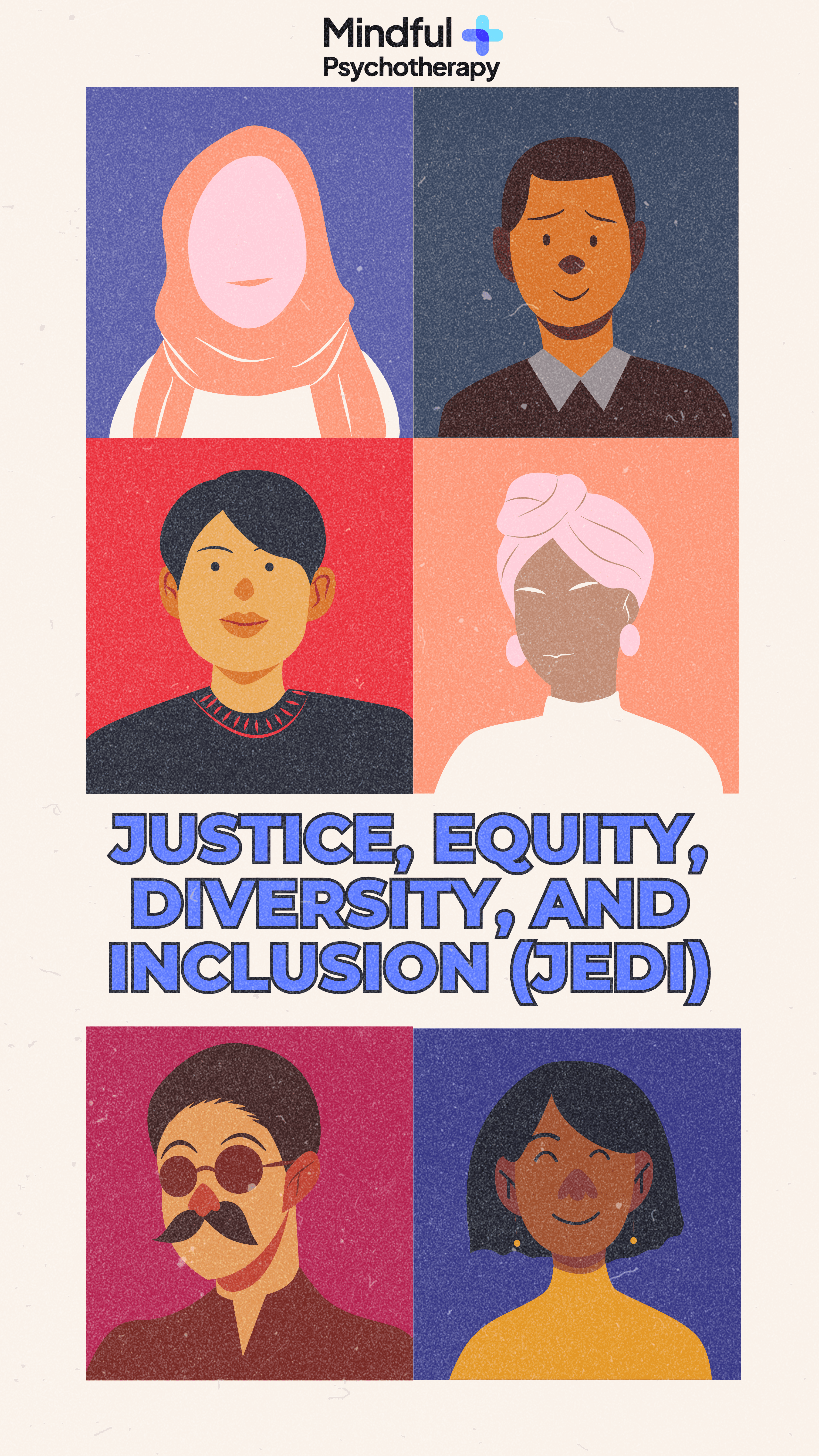February 14 2024 Mental Health JEDI

Written by: Nishat Ahmed
Reference: Kaleidoscope Newsletter of the Counselling Psychology Section. (December 2023). Issue No. 3. Canadian Psychological Association.
(JEDI)
Justice, Equity, Diversity, and Inclusion (JEDI) are integral components of a society that values the well-being of all its members. Within the field of mental health, addressing JEDI is not just a matter of ethics, but it is essential for providing effective care and support. South Asian minorities, a diverse group encompassing individuals with roots in countries such as India, Pakistan, Bangladesh, Sri Lanka, Nepal, and others, often face unique challenges in their mental health journey. This essay explores the significance of JEDI for South Asian minorities within the context of mental health.
The first component of JEDI is justice in mental health for South Asian minorities, which involves ensuring equal access to resources and opportunities. Many South Asians may encounter language barriers, cultural stigma, and socioeconomic disparities that hinder their access to mental health services. Researching this topic led me to this research article that had been recently conducted stating, “According to mental health service providers, South Asian youth navigate several unique stressors related to the domains of culture, religion, and family dynamics, experiences of discrimination, the impact of migration, beliefs around mental illness and help-seeking, help-seeking trajectories and therapy recommendations, and lastly, sex differences” (Islam et al., 2022). Therefore, advocating for linguistically appropriate services and culturally competent care is a crucial step toward justice. Furthermore, addressing biases and prejudices within the mental health system is vital. Culturally sensitive training for mental health professionals can mitigate these biases and lead to a more just system.
Secondly, achieving equity means acknowledging and addressing the unique mental health challenges South Asian minorities face. These challenges can be deeply rooted in cultural norms, such as the stigma surrounding mental health issues, where seeking help is often viewed as a sign of weakness. South Asians may need tailored interventions that consider these cultural beliefs and practices. Equity also demands that services are geographically accessible and affordable, ensuring that individuals from all walks of life can receive the help they need. Thirdly, the concept of diversity goes beyond merely recognizing differences; it celebrates them. South Asian minorities represent a rich tapestry of cultures, languages, religions, and traditions. In mental health, embracing this diversity means that treatment approaches must be flexible, adaptable, and respectful of the various backgrounds within this group. By accommodating diverse worldviews and cultural practices, mental health professionals can create a more inclusive and effective healing environment.
Lastly, inclusion entails creating a safe and welcoming space for South Asian minorities within the mental health community. It means valuing their voices, perspectives, and experiences. Inclusion can be fostered by encouraging South Asians to par-31 CPA KALEIDOSCOPE, which participates in the development of mental health policies, research, and community programs. Moreover, mental health services should actively involve South Asian communities in awareness campaigns, reducing the stigma around mental health and promoting well-being. Addressing JEDI for South Asian minorities in mental health involves a multi-pronged approach. One key aspect is destigmatizing mental health concerns. Many South Asian cultures place a significant emphasis on family reputation, which can lead to secrecy around mental health issues. To foster a more inclusive and just environment, open dialogues about mental health should be promoted within these communities. Peer support and community education initiatives can help dismantle the stigma. Cultural competence is another vital component. Mental health professionals must be equipped with the knowledge and skills to understand the cultural nuances and beliefs of South Asian minorities. Culturally tailored interventions can lead to better engagement and outcomes in treatment.
Collaboration between mental health organizations, community leaders, and faith-based institutions can play a pivotal role in fostering equity and inclusion. By working together, these stakeholders can develop culturally sensitive programs and ensure that South Asian individuals feel comfortable seeking help when needed.
In conclusion, addressing JEDI in mental health for South Asian minorities is both a moral imperative and a practical necessity. The mental health challenges faced by this group are intricately linked to cultural norms, access barriers, and stigma. To provide effective care, we must advocate for justice, equity, diversity, and inclusion. By acknowledging these principles, we can help create a mental health landscape where all South Asian individuals receive the support they deserve, regardless of their cultural background. It’s within this inclusive and equitable environment that true healing can take place, and the kaleidoscope of South Asian experiences can be celebrated and embraced.
Nishat's Background:
My name is Nishat Ahmed; I am a Bangladeshi Canadian. Born and raised in Canada. I am a Registered Psychotherapist (Qualifying) and the proud director of Mindful +Psychotherapy. I have a BA in development psychology and a postgraduate certificate in addictions and mental health. I have just recently finished my master’s degree in counselling psychology. The reason why I pursue mental health is deeply rooted in my advocacy for South Asian mental health. Recognizing the prevalent stigma within South Asian culture surrounding seeking mental health support, I am committed to challenging these perceptions and fostering a more accepting and understanding environment. It is my sincere belief that by advocating for and promoting mental health awareness and resources tailored to the South Asian community, we can effectively combat stigma and encourage individuals to seek the help they need without fear or judgment. Mental health is as crucial as physical well-being. I am deeply committed to social justice and mental health equity. My goal is to be able to show individuals that it is essential to affirm that seeking mental health assistance is not only acceptable but a courageous step towards personal well-being and empowerment, especially for individuals from minority populations.
